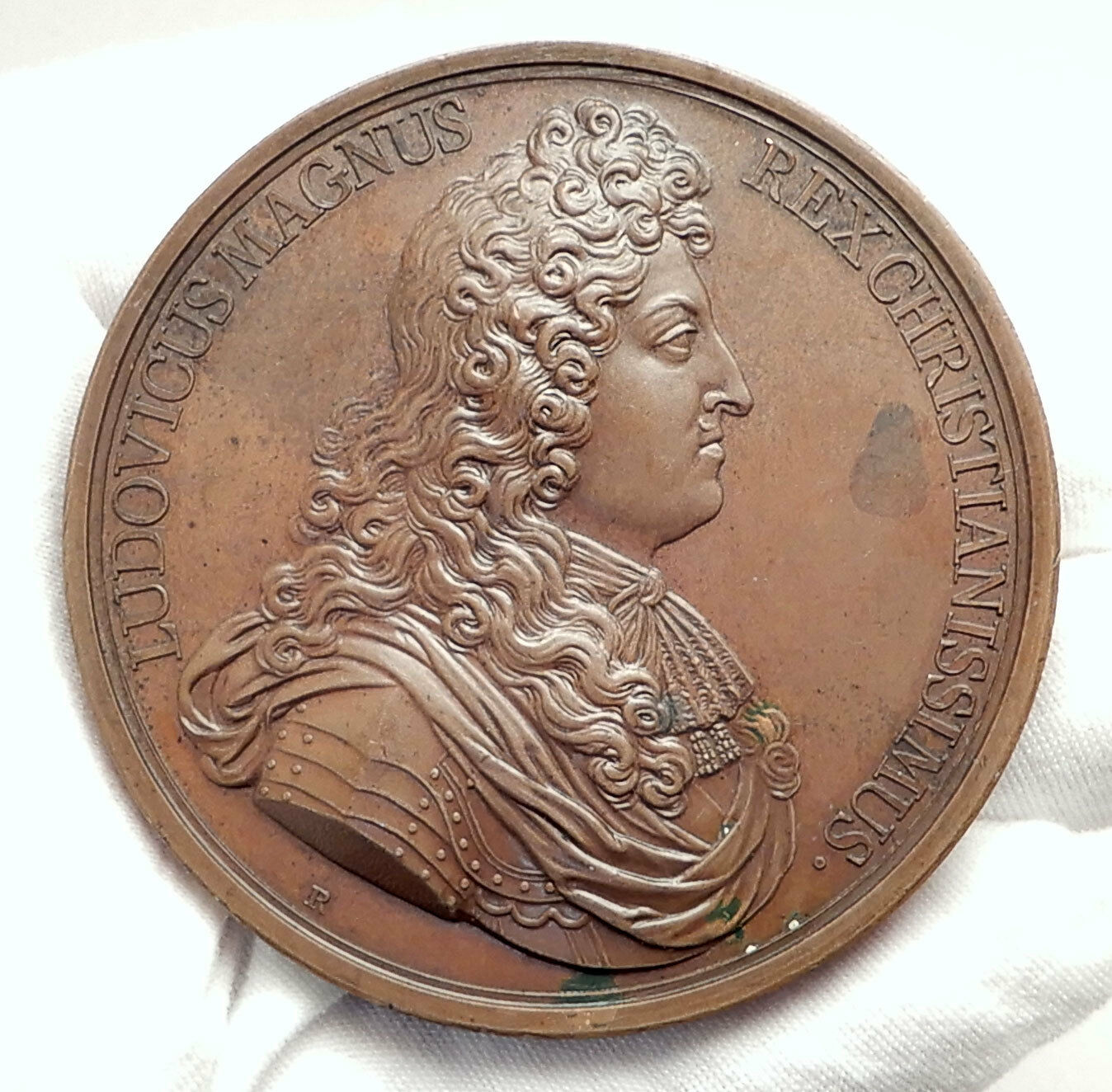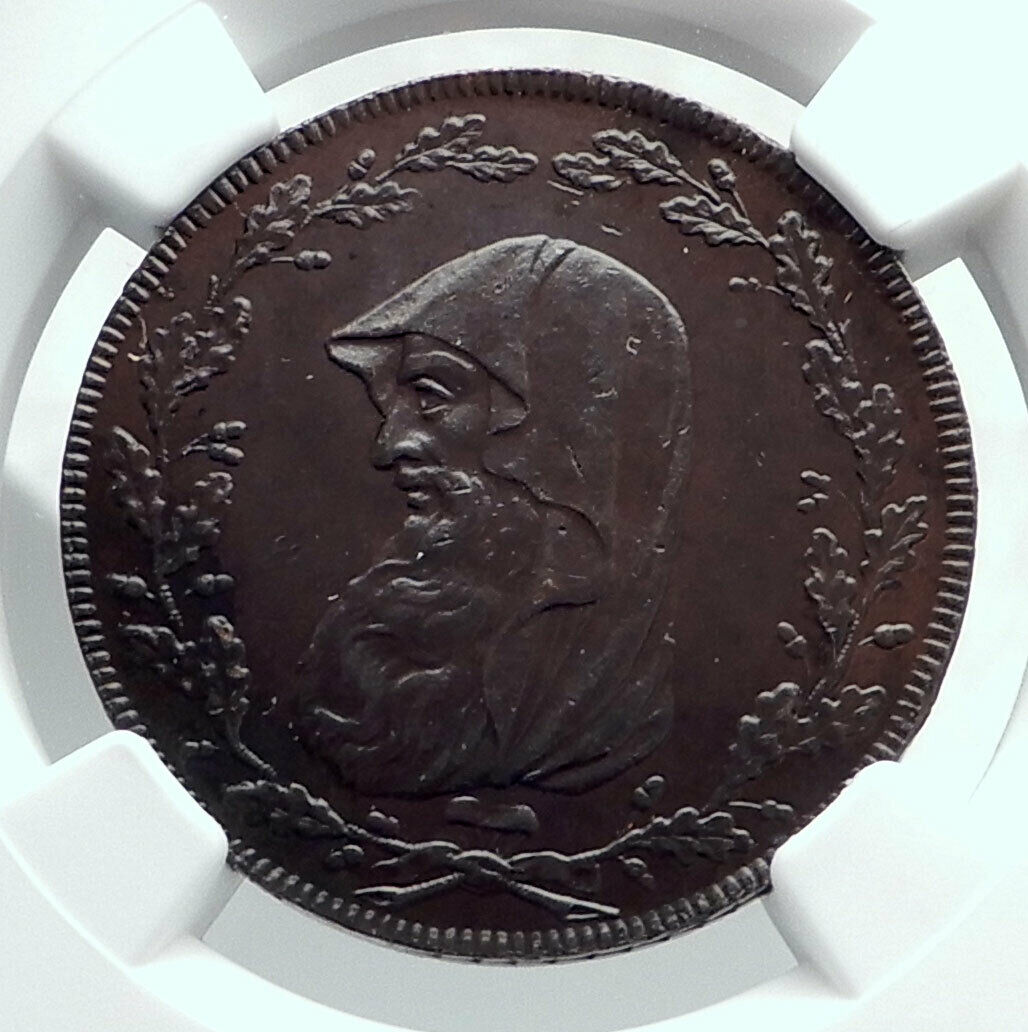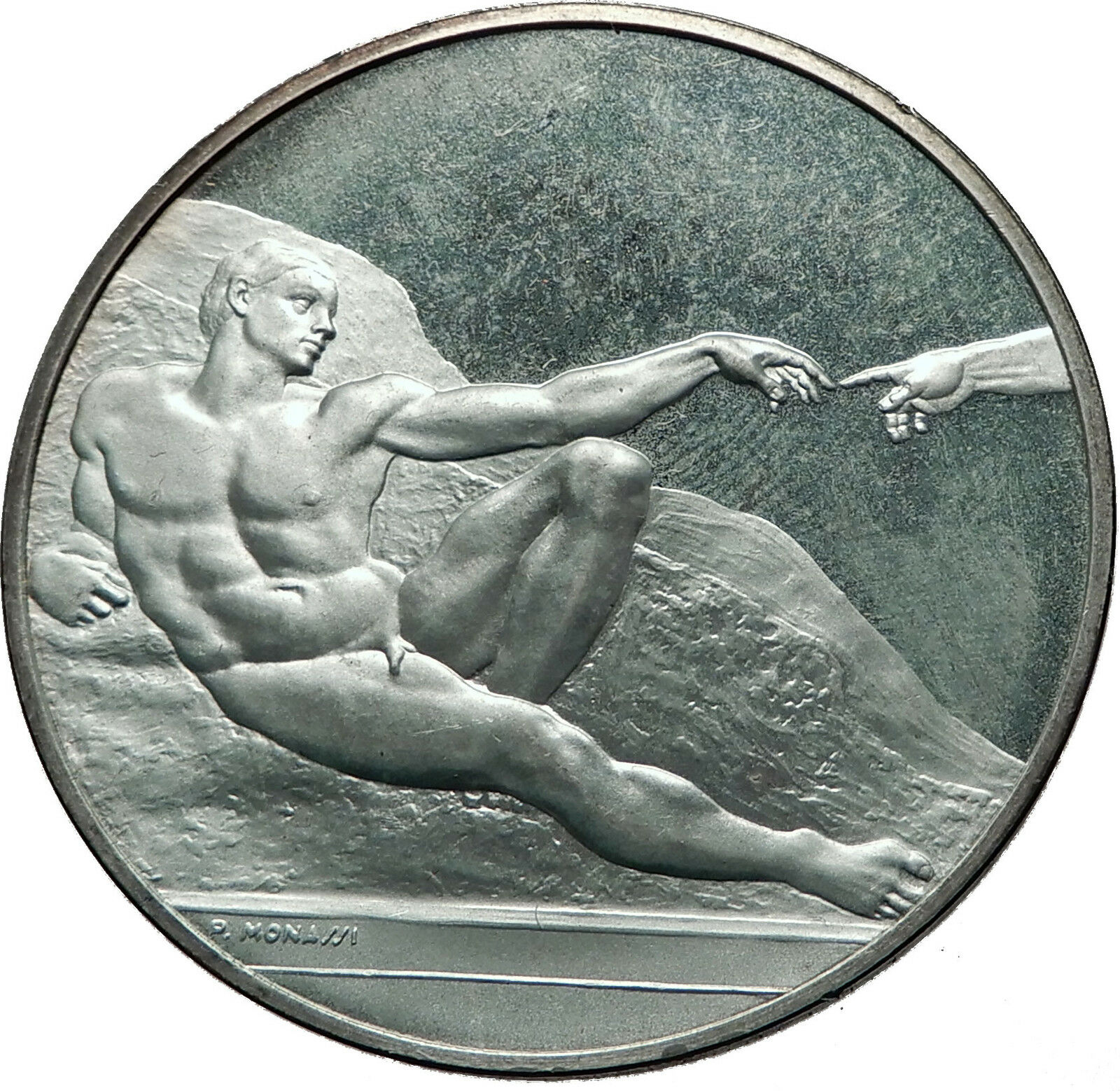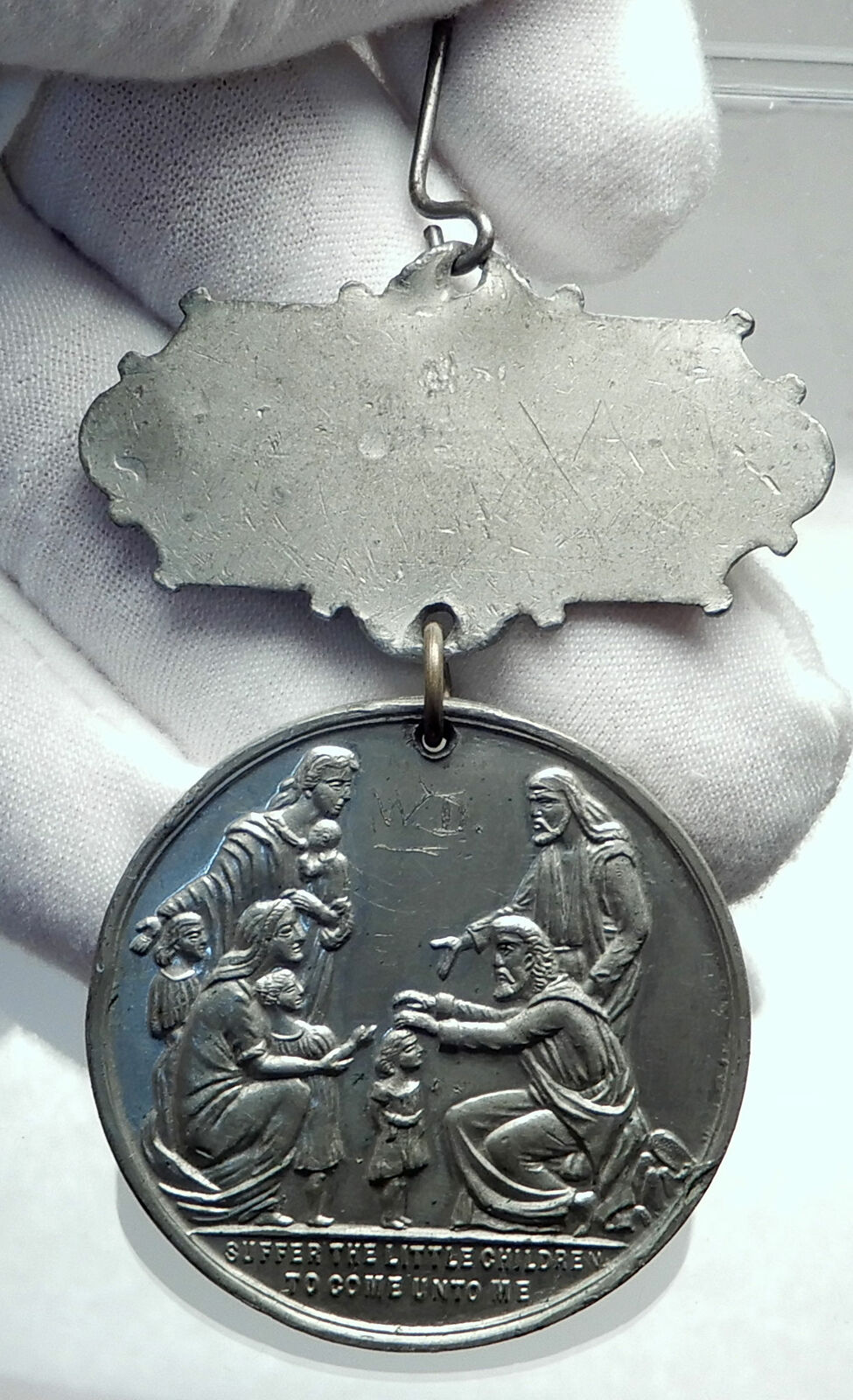|
Israel – Habima Theater – “The Dybbuk” State Medal, 5738-1978
1978 Silver Medal 45.0mm (47.00 grams) 0.935 Silver (1.432 oz. ASW) | Mint: Kretschmer
Reference: ICMC# 25071458, SM 58a | Designer: Rothschild and Lippman (“Roli”)
THE DYBBUK, Chana Rovina and the beggars, a scene from “The Dybbuk”.
HABIMAH NATIONAL THEATRE 1918 1978 60, Dual menorah-like logo.
Edge Lettering:
STATE OF ISRAEL 2924 STERLING 935
Coin Notes:
The “Habimah” Theater was established in Moscow in 1918 during the Russian Revolution by a group of Jewish youngsters devoted to the Hebrew language. Habimah pioneers proclaimed in the first paragraph of their theatre by-law: “The group is formed so it may afterwards establish the Habimah Theatre in Palestine”. As the pressure within the Soviet Union against the usage of Hebrew as a language grew, the group forsook Moscow for a series of performances in Europe and the United States. It reached Palestine in 1928. The Habimah Theater was opened in Tel Aviv in 1945 at a festive ceremony and in 1958, forty years after “Habimah” was founded in Moscow, the Minister of Education and Culture bestowed on behalf of the Government, the title “The National Theater”, to the “Habimah”.
You are bidding on the exact item pictured, provided with a Certificate of Authenticity and Lifetime Guarantee of Authenticity.
 The Habima Theatre (Hebrew: תיאטרון הבימה Te’atron HaBima, lit. “The Stage Theatre”) is the national theatre of Israel and one of the first Hebrew language theatres. It is located in Habima Square in the center of Tel Aviv. The Habima Theatre (Hebrew: תיאטרון הבימה Te’atron HaBima, lit. “The Stage Theatre”) is the national theatre of Israel and one of the first Hebrew language theatres. It is located in Habima Square in the center of Tel Aviv.
 Habima was founded by Nahum Zemach in Białystok (then in Grodno Governorate, Russia) in 1912. Menahem Gnessin was one of its cofounders and early actors. Because its performances were in Hebrew, invoked the Jewish folk tradition, and dealt with issues of the Jewish people, it met with persecution by the Czarist government. Beginning in 1918, it operated under the auspices of the Moscow Art Theatre, which some consider its true beginning. It encountered difficulties under the Soviet government as well as after the Russian Revolution. Konstantin Stanislavsky arranged for the mainly Jewish Polish actors to be trained by Yevgeny Vakhtangov. The People’s Commissar for Nationalities Affairs, Joseph Stalin, also authorized the theatre’s creation. However, the Yevsektsiya attempted to use its influence to cut off state funds to Habima, branding it counter-revolutionary. Habima was founded by Nahum Zemach in Białystok (then in Grodno Governorate, Russia) in 1912. Menahem Gnessin was one of its cofounders and early actors. Because its performances were in Hebrew, invoked the Jewish folk tradition, and dealt with issues of the Jewish people, it met with persecution by the Czarist government. Beginning in 1918, it operated under the auspices of the Moscow Art Theatre, which some consider its true beginning. It encountered difficulties under the Soviet government as well as after the Russian Revolution. Konstantin Stanislavsky arranged for the mainly Jewish Polish actors to be trained by Yevgeny Vakhtangov. The People’s Commissar for Nationalities Affairs, Joseph Stalin, also authorized the theatre’s creation. However, the Yevsektsiya attempted to use its influence to cut off state funds to Habima, branding it counter-revolutionary.
 Israel (/ˈɪzriəl, ˈɪzreɪəl/; Hebrew: יִשְׂרָאֵל; Arabic: إِسْرَائِيل), officially the State of Israel, is a country in the Middle East, on the southeastern shore of the Mediterranean Sea and the northern shore of the Red Sea. It has land borders with Lebanon to the north, Syria to the northeast, Jordan on the east, the Palestinian territories of the West Bank and Gaza Strip to the east and west, respectively, and Egypt to the southwest. The country contains geographically diverse features within its relatively small area. Israel’s economic and technological center is Tel Aviv, while its seat of government and proclaimed capital is Jerusalem, although the state’s sovereignty over Jerusalem has only partial recognition. Israel (/ˈɪzriəl, ˈɪzreɪəl/; Hebrew: יִשְׂרָאֵל; Arabic: إِسْرَائِيل), officially the State of Israel, is a country in the Middle East, on the southeastern shore of the Mediterranean Sea and the northern shore of the Red Sea. It has land borders with Lebanon to the north, Syria to the northeast, Jordan on the east, the Palestinian territories of the West Bank and Gaza Strip to the east and west, respectively, and Egypt to the southwest. The country contains geographically diverse features within its relatively small area. Israel’s economic and technological center is Tel Aviv, while its seat of government and proclaimed capital is Jerusalem, although the state’s sovereignty over Jerusalem has only partial recognition.

Israel has evidence of the earliest migration of hominids out of Africa. Canaanite tribes are archaeologically attested since the Middle Bronze Age, while the Kingdoms of Israel and Judah emerged during the Iron Age. The Neo-Assyrian Empire destroyed Israel around 720 BCE. Judah was later conquered by the Babylonian, Persian and Hellenistic empires and had existed as Jewish autonomous provinces. The successful Maccabean Revolt led to an independent Hasmonean kingdom by 110 BCE, which in 63 BCE however became a client state of the Roman Republic that subsequently installed the Herodian dynasty in 37 BCE, and in 6 CE created the Roman province of Judea. Judea lasted as a Roman province until the failed Jewish revolts resulted in widespread destruction, expulsion of Jewish population and the renaming of the region from Iudaea to Syria Palaestina. Jewish presence in the region has persisted to a certain extent over the centuries. In the 7th century the Levant was taken from the Byzantine Empire by the Arabs and remained in Muslim control until the First Crusade of 1099, followed by the Ayyubid conquest of 1187. The Mamluk Sultanate of Egypt extended its control over the Levant in the 13th century until its defeat by the Ottoman Empire in 1517. During the 19th century, national awakening among Jews led to the establishment of the Zionist movement in the diaspora followed by waves of immigration to Ottoman and later British Palestine.
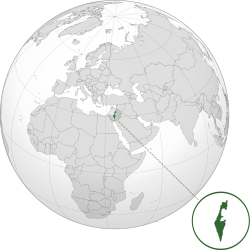 In 1947, the United Nations adopted a Partition Plan for Palestine recommending the creation of independent Arab and Jewish states and an internationalized Jerusalem. The plan was accepted by the Jewish Agency, and rejected by Arab leaders. The following year, the Jewish Agency declared the independence of the State of Israel, and the subsequent 1948 Arab-Israeli War saw Israel’s establishment over most of the former Mandate territory, while the West Bank and Gaza were held by neighboring Arab states. Israel has since fought several wars with Arab countries, and it has since 1967 occupied territories including the West Bank, Golan Heights and the Gaza Strip (still considered occupied after 2005 disengagement, although some legal experts dispute this claim). It extended its laws to the Golan Heights and East Jerusalem, but not the West Bank. Israel’s occupation of the Palestinian territories is the world’s longest military occupation in modern times.[fn 4][49] Efforts to resolve the Israeli-Palestinian conflict have not resulted in a final peace agreement. However, peace treaties between Israel and both Egypt and Jordan have been signed. In 1947, the United Nations adopted a Partition Plan for Palestine recommending the creation of independent Arab and Jewish states and an internationalized Jerusalem. The plan was accepted by the Jewish Agency, and rejected by Arab leaders. The following year, the Jewish Agency declared the independence of the State of Israel, and the subsequent 1948 Arab-Israeli War saw Israel’s establishment over most of the former Mandate territory, while the West Bank and Gaza were held by neighboring Arab states. Israel has since fought several wars with Arab countries, and it has since 1967 occupied territories including the West Bank, Golan Heights and the Gaza Strip (still considered occupied after 2005 disengagement, although some legal experts dispute this claim). It extended its laws to the Golan Heights and East Jerusalem, but not the West Bank. Israel’s occupation of the Palestinian territories is the world’s longest military occupation in modern times.[fn 4][49] Efforts to resolve the Israeli-Palestinian conflict have not resulted in a final peace agreement. However, peace treaties between Israel and both Egypt and Jordan have been signed.
In its Basic Laws, Israel defines itself as a Jewish and democratic state. Israel is a representative democracy[neutrality is disputed] with a parliamentary system, proportional representation and universal suffrage. The prime minister is head of government and the Knesset is the legislature. Israel is a developed country and an OECD member, with the 32nd-largest economy in the world by nominal gross domestic product as of 2017. The country benefits from a highly skilled workforce and is among the most educated countries in the world with one of the highest percentages of its citizens holding a tertiary education degree. Israel has the highest standard of living in the Middle East, and has one of the highest life expectancies in the world.
|








 The Habima Theatre (Hebrew: תיאטרון הבימה Te’atron HaBima, lit. “The Stage Theatre”) is the national theatre of Israel and one of the first Hebrew language theatres. It is located in Habima Square in the center of Tel Aviv.
The Habima Theatre (Hebrew: תיאטרון הבימה Te’atron HaBima, lit. “The Stage Theatre”) is the national theatre of Israel and one of the first Hebrew language theatres. It is located in Habima Square in the center of Tel Aviv. Habima was founded by Nahum Zemach in Białystok (then in Grodno Governorate, Russia) in 1912. Menahem Gnessin was one of its cofounders and early actors. Because its performances were in Hebrew, invoked the Jewish folk tradition, and dealt with issues of the Jewish people, it met with persecution by the Czarist government. Beginning in 1918, it operated under the auspices of the Moscow Art Theatre, which some consider its true beginning. It encountered difficulties under the Soviet government as well as after the Russian Revolution. Konstantin Stanislavsky arranged for the mainly Jewish Polish actors to be trained by Yevgeny Vakhtangov. The People’s Commissar for Nationalities Affairs, Joseph Stalin, also authorized the theatre’s creation. However, the Yevsektsiya attempted to use its influence to cut off state funds to Habima, branding it counter-revolutionary.
Habima was founded by Nahum Zemach in Białystok (then in Grodno Governorate, Russia) in 1912. Menahem Gnessin was one of its cofounders and early actors. Because its performances were in Hebrew, invoked the Jewish folk tradition, and dealt with issues of the Jewish people, it met with persecution by the Czarist government. Beginning in 1918, it operated under the auspices of the Moscow Art Theatre, which some consider its true beginning. It encountered difficulties under the Soviet government as well as after the Russian Revolution. Konstantin Stanislavsky arranged for the mainly Jewish Polish actors to be trained by Yevgeny Vakhtangov. The People’s Commissar for Nationalities Affairs, Joseph Stalin, also authorized the theatre’s creation. However, the Yevsektsiya attempted to use its influence to cut off state funds to Habima, branding it counter-revolutionary. Israel (/ˈɪzriəl, ˈɪzreɪəl/; Hebrew: יִשְׂרָאֵל; Arabic: إِسْرَائِيل), officially the State of Israel, is a country in the Middle East, on the southeastern shore of the Mediterranean Sea and the northern shore of the Red Sea. It has land borders with Lebanon to the north, Syria to the northeast, Jordan on the east, the Palestinian territories of the West Bank and Gaza Strip to the east and west, respectively, and Egypt to the southwest. The country contains geographically diverse features within its relatively small area. Israel’s economic and technological center is Tel Aviv, while its seat of government and proclaimed capital is Jerusalem, although the state’s sovereignty over Jerusalem has only partial recognition.
Israel (/ˈɪzriəl, ˈɪzreɪəl/; Hebrew: יִשְׂרָאֵל; Arabic: إِسْرَائِيل), officially the State of Israel, is a country in the Middle East, on the southeastern shore of the Mediterranean Sea and the northern shore of the Red Sea. It has land borders with Lebanon to the north, Syria to the northeast, Jordan on the east, the Palestinian territories of the West Bank and Gaza Strip to the east and west, respectively, and Egypt to the southwest. The country contains geographically diverse features within its relatively small area. Israel’s economic and technological center is Tel Aviv, while its seat of government and proclaimed capital is Jerusalem, although the state’s sovereignty over Jerusalem has only partial recognition.
 In 1947, the United Nations adopted a Partition Plan for Palestine recommending the creation of independent Arab and Jewish states and an internationalized Jerusalem. The plan was accepted by the Jewish Agency, and rejected by Arab leaders. The following year, the Jewish Agency declared the independence of the State of Israel, and the subsequent 1948 Arab-Israeli War saw Israel’s establishment over most of the former Mandate territory, while the West Bank and Gaza were held by neighboring Arab states. Israel has since fought several wars with Arab countries, and it has since 1967 occupied territories including the West Bank, Golan Heights and the Gaza Strip (still considered occupied after 2005 disengagement, although some legal experts dispute this claim). It extended its laws to the Golan Heights and East Jerusalem, but not the West Bank. Israel’s occupation of the Palestinian territories is the world’s longest military occupation in modern times.[fn 4][49] Efforts to resolve the Israeli-Palestinian conflict have not resulted in a final peace agreement. However, peace treaties between Israel and both Egypt and Jordan have been signed.
In 1947, the United Nations adopted a Partition Plan for Palestine recommending the creation of independent Arab and Jewish states and an internationalized Jerusalem. The plan was accepted by the Jewish Agency, and rejected by Arab leaders. The following year, the Jewish Agency declared the independence of the State of Israel, and the subsequent 1948 Arab-Israeli War saw Israel’s establishment over most of the former Mandate territory, while the West Bank and Gaza were held by neighboring Arab states. Israel has since fought several wars with Arab countries, and it has since 1967 occupied territories including the West Bank, Golan Heights and the Gaza Strip (still considered occupied after 2005 disengagement, although some legal experts dispute this claim). It extended its laws to the Golan Heights and East Jerusalem, but not the West Bank. Israel’s occupation of the Palestinian territories is the world’s longest military occupation in modern times.[fn 4][49] Efforts to resolve the Israeli-Palestinian conflict have not resulted in a final peace agreement. However, peace treaties between Israel and both Egypt and Jordan have been signed. 

